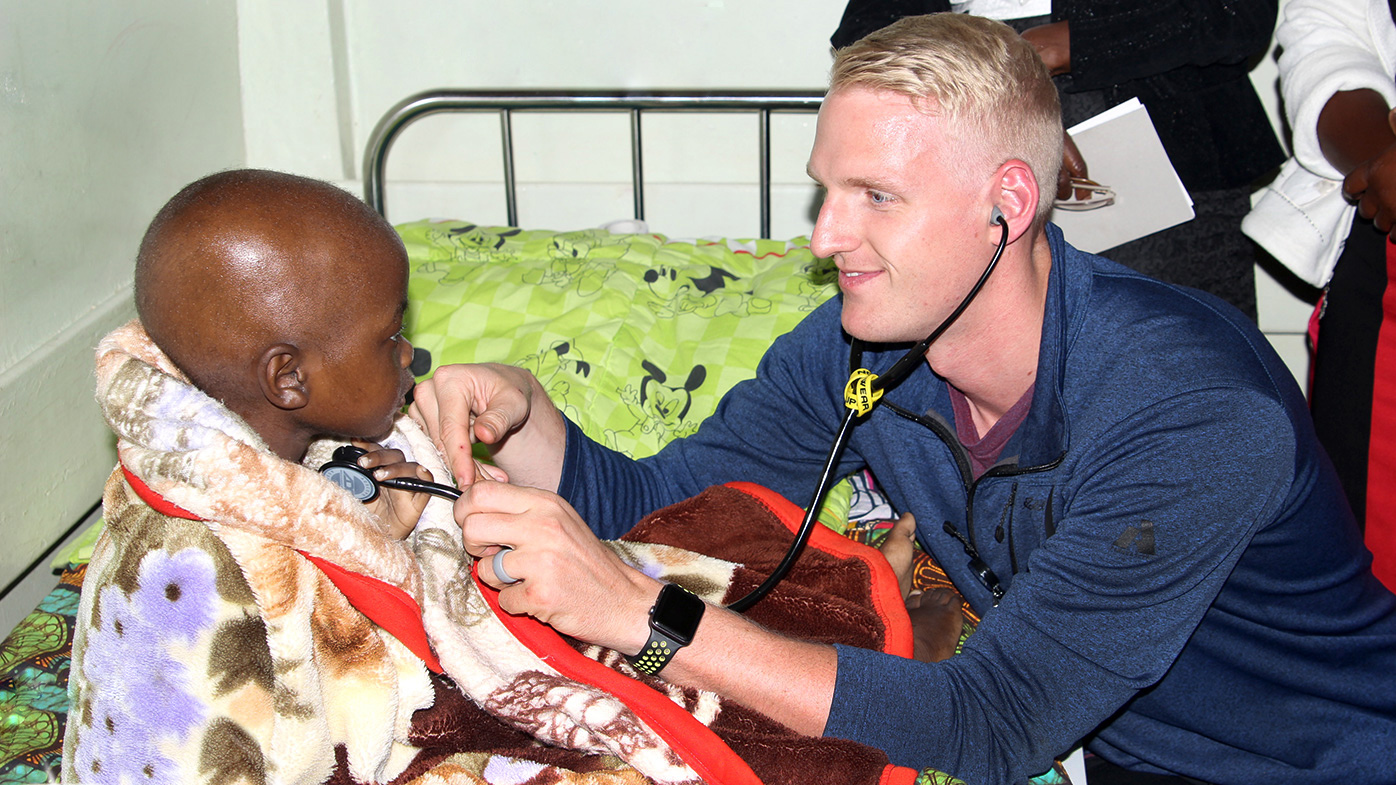The treatment situation for children with cancer and blood disorders in Africa is dire, much like HIV and AIDS was in the 1990s, when there were too few doctors and too little access to quality medical treatment. In the U.S., more than 80 percent of children with cancer will survive; in sub-Saharan Africa, the mortality rate is estimated to be as high as 90 percent. This translates into thousands of children across the continent dying from cancer each year and results largely from to a severe shortage of expert physicians and other healthcare workers trained to diagnose and treat children with cancer.
Aaron Mansfield, a pediatric oncology nurse from Texas Children's Hospital, caring for children at Kamuzu Hospital in Lilongwe, Malawi, as part of the Global HOPE initiative to build treatment capacity for children with cancer in southern and east Africa.
BRISTOL MYERS SQUIBB FOUNDATION
Bringing hope where there was little
The role of a pediatric oncology nurse is challenging under the best of circumstances. Imagine having to worry about whether your hospital has running water or if securing safe blood, if any blood at all, is even possible.
To nurses in most Western hospitals, these situations are unimaginable. Yet, they are common in many sub-Saharan Africa nations.
Janet DeJean and Aaron Mansfield had an opportunity to take a first-hand look at such challenges last June while on location in Malawi. Both are pediatric oncology nurses from Texas Children's Hospital, who volunteered to provide a week of training at Kamuzu Hospital in Lilongwe, Malawi, as part of a global initiative to build treatment capacity for children with cancer in southern and east Africa.
“We had a chance to step into their world, to see the challenges they faced in their daily care for pediatric cancer patients, and then teach them how to become more effective in their role as nurses,” Janet says.
The training comes through Global HOPE (Hematology-Oncology Pediatric Excellence), a $100-million initiative funded by the Bristol Myers Squibb Foundation, Texas Children's Cancer and Hematology Centers and Baylor International Pediatric AIDS Initiative, working with local governments to build a comprehensive training and treatment network for pediatric cancer and blood disorders in southern and east Africa. Global HOPE is focused in three countries – Botswana, Malawi and Uganda – that will serve as ‘hubs of excellence’ for the region.
Changing the course of pediatric care
Just as the Bristol Myers Squibb Foundation's groundbreaking SECURE THE FUTURE program changed the course of pediatric HIV/AIDS in Africa by building an infrastructure that included trained healthcare providers and improved access to treatments, Global HOPE is addressing pediatric hematology and oncology. The initiative will create a network of healthcare professionals trained in pediatric cancer and blood disorders to establish Pediatric Hematology and Oncology Centers of Excellence that will serve as ‘flagship’ institutions for clinical care, education, research and healthcare management experience.
Nurses are an integral part of any treatment continuum, but especially so in oncology. The training sessions for pediatric oncology nurses are designed to give them the tools to play a more prominent role in patient care.
Nurses in sub-Saharan Africa are often stretched thin. A shortage of trained healthcare professionals adds to the workload and means they must take on additional responsibilities, such as mixing their patients' chemotherapy.
With a shortage of trained medical professionals in sub-Saharan Africa, Global HOPE sends pediatric oncology doctors and nurses, like Janet DeJean (pictured here) from Texas Children's Hospital.
“Nurses are with patients for extended periods of time during the day and they see things that a doctor making rounds may not,” Aaron says. “Their challenges weren't about how to take care of their patients, but how to work around things that we take for granted.”
Practical, hands-on patient assessments reinforced what was taught in the classroom. Aaron recalls a case that immediately followed a lesson on what to expect toward the end of a patient's course of chemotherapy.
“During our rounds with the class, a student noted that a five-year-old patient began shivering and was running a fever less than 30 minutes after receiving chemo. Because of the recent training, that triggered a meeting with the oncologist and a whole treatment plan that prevented complications further down the road,” he relates.
Empowering nurses
Training like that builds confidence. “It empowered the nurses to make decisions and to speak up and call an issue to a doctor's attention when it was warranted,” Janet says. “They had a better idea of the larger role they could play in a patient's care, beyond what they already do.”
Despite the difference in geography and resources of their home hospitals, Aaron, Janet and the nurses in Malawi share many of the same concerns: having a child die unexpectedly, or having to deliver a poor prognosis or bad news to a family for example. “Knowing that those concerns are universal was very reassuring for the nurses in Africa to learn,” Janet explains.
Global HOPE will train an estimated 4,800 healthcare professionals in southern and east Africa, including nurses, doctors, radiologists and social workers in the first five years of the program, and tens of thousands of children are expected to receive care.
This initiative is a public-private partnership working closely with the local governments and ministries of health to build a self-sustaining model. As professionals in Africa are trained by the U.S. and international teams, they will then take over training other African professionals. As more healthcare professionals are trained, there is potential for many more children to be treated and, ultimately, for the prognosis for children with cancer to improve to match the numbers in the U.S. and Europe.



